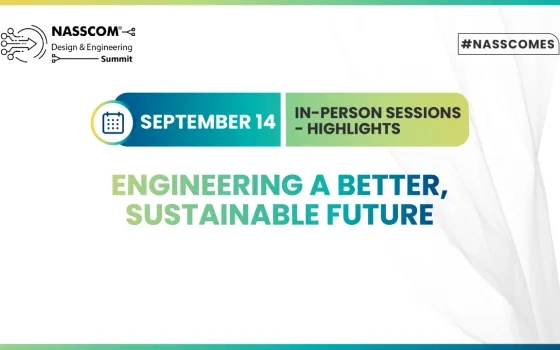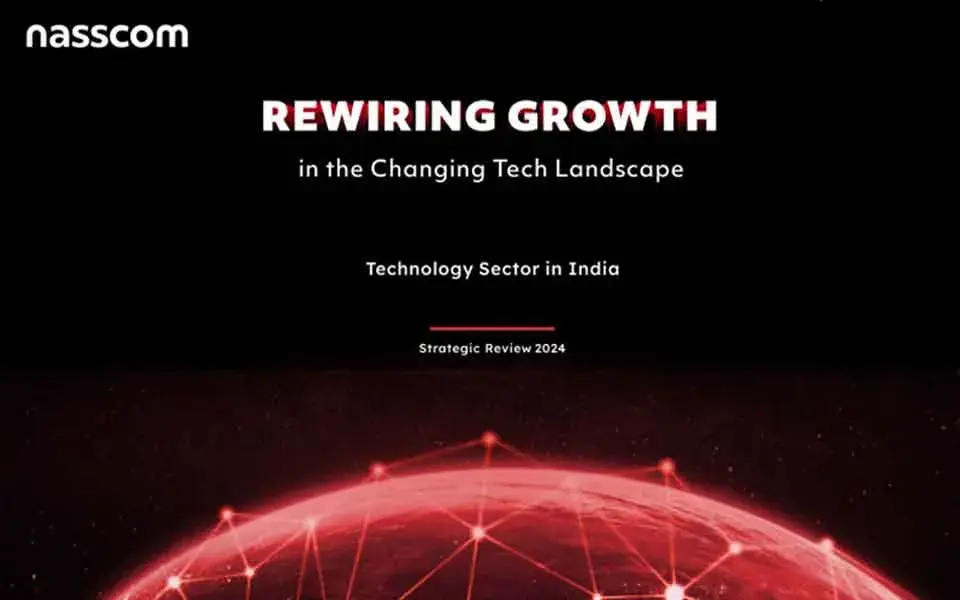With the theme of ‘Designing a Sustainable, Connected Future’, the 14th NASSCOM Design & Engineering Summit celebrated the success of the global engineering & design ecosystem. This two-day hybrid summit focussed on sustainability, innovation, hyperconnectivity and the future of engineering.
Here, we have gathered insights & takeaways from our sessions on ‘Engineering a Better, Sustainable Future’ held on September 14, 2022.
Morning Episodes
The day started with an insightful workshop, Addressing Designing a Sustainable and Connected Future for Aerospace with Dr Kallappa Pattada, Leader, Research & Technology, Boeing, UMA Maheshwar D, Chief Consulting Engineer, GE Aviation, Shashikiran Ananth, Director, Engineering, Collins Aerospace, George Koilpillai, Engineering Chief, Honeywell, and Srinivas Dwarakanath, Strategic Consultant Aerospace & Aviation. Srinivas Dwarakanath shared that sustainable aviation fuel will contribute significantly and is expected to contribute to about 65% of the emission reductions over the next 30 years. Dr Kallappa Pattada spoke about how they are committed to making all their plants and factories net zero emitors. Shashikiran Ananth believes that future leaders will master the technology to attain sustainability and meet the industry and government regulation requirements. George Koilpillai spoke about how the emissions from the aircraft stay in the atmosphere for about 1000 years to be recycled by the environment. He believes that the use of sustainable aviation fuel is one way to solve the issue at hand. The other way is to use technology very efficiently to reduce fuel consumption. Uma Maheshwar spoke about how engineers are working on fundamental path-breaking research, having achieved fantastic and promising results on hydrogen as a potential fuel in the future and are also working on challenges like the current operating cycle and reimagining the entire propulsion system.
We then had a special address by Meena Nagaraj C.N, IAS - Director IT & BT, Department of IT, BT and S&T, Government of Karnataka. She spoke about how the pandemic has changed the way we work and created more opportunities in the R&D space. With immense pride, she said that Karnataka has and continues to be a leading contributor to our nation's engineering R&D industry revenue and is home to over 400 R&D facilities. Also, Karnataka as a state has put forward their efforts in building an industry-friendly ecosystem with an enabling policy and regulatory framework in place and will continue to include inputs from industry partners in decisions taken for the growth of the ecosystem.
Next, we had Dr Ajay Prabhu, PhD, President, Technology Services, Quest Global, Sanjeev Sharma, Country Head and Managing Director, ABB India Ltd., and Kamal Bali, President & Managing Director, Volvo Group, India talking about Tapping on the India Advantage: Increasing R&D Focus. Sanjeev Sharma spoke about how he believes that India is going to be a key provider of talent in the next 10-20 years in many areas, including R&D. Kamal Bali mentioned that previously India was always seen as high on potential but moderate on performance, which has shifted today. The key lies in innovation which will help shift India's narrative from being cost-centric to value-centric.
In the next session, we were joined by Sonali Kulkarni, President & CEO, FANUC India Pvt Ltd and K S Viswanathan Ksv, Vice President, Industry Initiatives, NASSCOM on Industry 4.0 at the Heart of Sustainable Manufacturing. The leaders spoke about how they can implement sustainable manufacturing practices and formulate critical strategies for their transition toward Industry 4.0. Sonali Kulkarni stated that we are on the threshold of significant growth in technology. She believes that using network systems to gather real-time data and ensure efficient production is the objective of any shop floor. She also talked about how sustainability is about using resources responsibly, thinking beyond the self, and seeing how we can leave or create success for not just ourselves but our stakeholders, suppliers, vendors, customers, employees, shareholders, and the planet.
We then had Hareesh Chandrasekar, Co-founder & COO of AGNIT Semiconductors Pvt Ltd for the first Innovation Corner of the day. He spoke about the next revolution in the semicon industry and his belief that there will be a massive shift in terms of wireless communication networks moving to 5G. He spoke about how semiconductor manufacturing will change as silicon will be replaced with Gallium Nitride (GaN) which is more efficient.
Afternoon Episodes
The afternoon started with an insightful fireside chat where we were joined by Sangeet Kumar, Cofounder & CEO, Addverb Technologies Private Limited and Shashidhara Dongre, Global Head, Embedded Systems, L&T Technology Services Limited talking about Embedded Systems for Smart Supply-Chain Advantage. Shashidhara Dongre started the session by dividing the supply chain in three buckets - manufacturing of the product, movement of materials, goods, and materials within the manufacturing plant, and distribution. He further spoke about how 70-80% of the industry needs motorised equipment for automation, and motor failure is a critical challenge within manufacturing plants. Sangeet Kumar spoke about how warehousing forecasting for a country like India is challenging, and optimization engines in use in the country have limitations. He believes that the only way of addressing this issue is with automation and becoming more responsive. Kumar strongly advocated that we need to build products in India.
We were then joined by a stellar panel for a leaders’ discussion on Managing Talent Complexity - Alok Nanda, CTO GE South Asia & CEO, GE India Technology Centre, Ahmed Elsherbini, Managing Director, Boeing India Engineering & Technology Center, Chief Engineer, Boeing India, Nataraj Kumar, Senior Director, Research Healthcare Solutions, Philips and Krishna Bandaru, Chief Business Officer, Skill-Lync. Alok Nanda emphasized on upskilling traditional engineering expertise with time to prevent them from becoming obsolete. Ahmed Elsherbini talked about how earlier companies came to India due to cost incentives and now the focus has shifted to end-to-end capability. Nataraj Kumar creating a community with experts that the team can reach out to will help people gain experience and the required expertise.
For the next leaders' discussion on Digital Drivers for Sustainable Manufacturing, we were joined by Aditi Sharma, Group Chief Quality Officer, Vedanta Resources Limited, Derick Jose, Co-founder, Flutura Decision Sciences & Analytics and Shamik Mishra, VP, CTO Connectivity, Capgemini Engineering. According to Aditi Sharma, data science has improved decision-making to the point that it has positively impacted the P&L. Adding to this, Derrick Jose shared that aligning mindset, behaviour and incentives and embedding digital into the company objectives and existing behaviour is the right way to deal with challenges related to implementing new digital projects.
For the leaders' discussion on Building Last Mile Ecosystem with Next-Gen Equipment, we were joined by Hari Marar, MD and CEO, Bangalore International Airport Ltd, Sandeep Maini, Chairman, Maini Group and Gopikrishnan Konnanath, SVP, Global Head – Engineering Services and Blockchain, Infosys. Answering questions on how we can improve efficiencies and make last-mile delivery sustainable, Sandeep Maini shared that it's no longer an era of looking at products, it's the era of collaboration, cooperation and giving complete solutions!
To talk about Developing a Winning Ecosystem with Purpose, we were joined by startup founders Devi Mani, Founder, Skooc, Samarth Kholkar, CEO & Co-Founder, BLive, and Sowjanya S., Founder, AttitudeMakeover. Sowjanya started the session by sharing that there are 3 Ps that are important to drive sustainable transformation - Profit, People, Planet. Purpose plays a vital role to bring these together and accelerate the sustainable journey. Samarth added by sharing that people and communities are two important factors to any successful sustainable initiatives. According to Devi, sustainability has always been about empathy for people, building resilience, being able to attract talent and build against adversaries.
Following this, we had Harsha K., Founder and CEO, HoloSuit join us for the Innovation Corner. He shared how at HoloSuit, they are trying to build the ‘Skill Metaverse’ where humans can skill themselves and their robots using deep tech like AR/VR, AI, Robotics and 5G. He also shared examples of how the technology is already being used in spaces like defence and training and emphasised on the need for India to lead in the innovation space.
For the closing keynote, Future Outlook on Emerging Tech for Digital Engineering, we were joined by Sophia Velastegui, Chief Product Officer & Senior Vice President, Aptiv. She talked in-depth about how technology and designing can reduce wastage, increase sustainability, the use of digital twins, managing risk assessment and more.
The in-person sessions of the 14th NASSCOM Design and Engineering Summit ended with a high tea and lots of business and networking conversations. Going hybrid for the first time, the summit was very well received by the delegates, sponsors, and speakers. Bringing the entire ER&D ecosystem together gave us many memorable and insightful sessions and talks. There are many conversations that we are taking as learning for our next edition. See you in 2023!
September 12 & 14, 2022
https://nasscom.in/engineeringsummit














